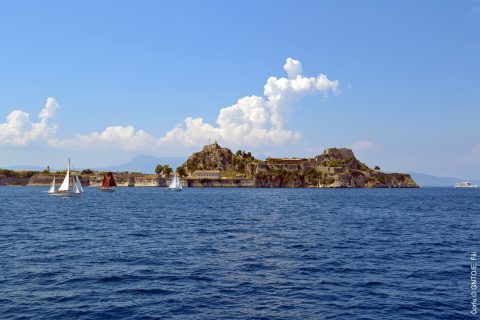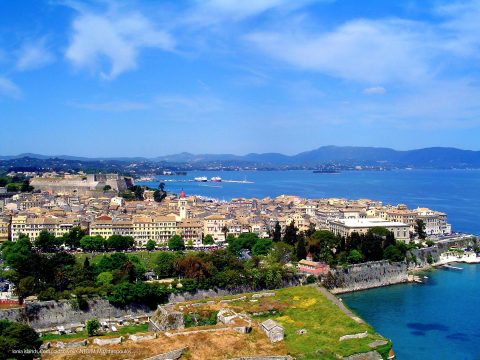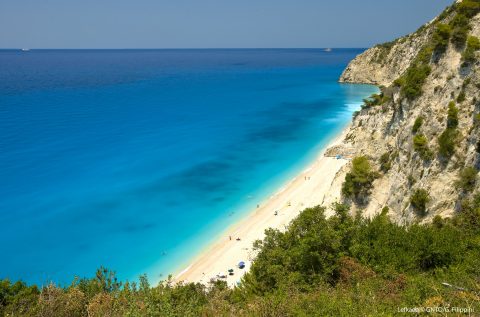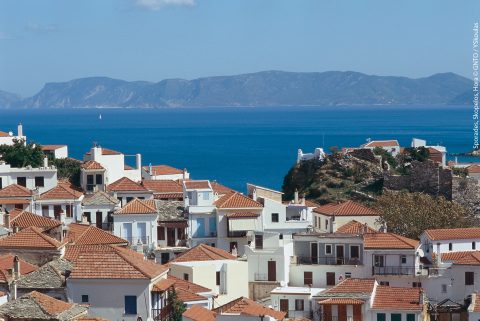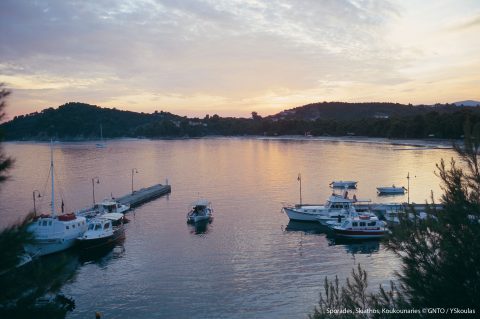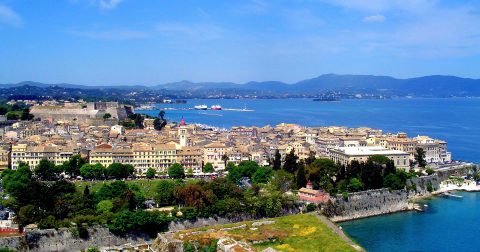Griechenland
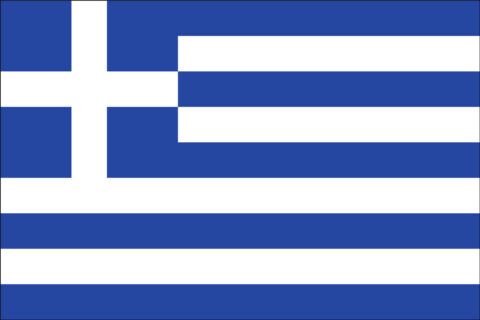 Zahlreiche kleine Inseln, malerische Buchten, lange Sandstrände, glasklares Wasser und tausende Kilometer Küstenlinie machen Griechenland zu einem attraktiven Wassersportrevier. Segeln und Motorbootfahren im Land der Götter.
Zahlreiche kleine Inseln, malerische Buchten, lange Sandstrände, glasklares Wasser und tausende Kilometer Küstenlinie machen Griechenland zu einem attraktiven Wassersportrevier. Segeln und Motorbootfahren im Land der Götter.
Hier war die Geburtsstunde der Antike mit ihren archäologischen Stätten, wie Akropolis oder Orakel von Delphi, um nur wenige zu nennen. Reisen auf den Spuren von Odysseus, wie es so schön heißt.
Inhaltsverzeichnis
Revier- und Länderbeschreibung Griechenland
Mit seiner vielfältigen Inselwelt bietet Griechenland zahlreiche Reviere für Segler und Bootfahrer. Sie alle unterscheiden sich hinsichtlich Größe, Landschaft und in ihrem nautischen Anspruch. Vom Einsteiger-Revier bis hin zum Ausgangspunkt für herausfordernde Törns ist alles dabei. Zu den beliebtesten Revieren zählen
- die Ionischen Inseln
- der Saronische Golf
- die Nördlichen Sporaden
- die Kykladen
Die Ionischen Inseln
Die Ionischen Inseln bieten viel Abwechslung. Einsame Buchten und Traumstrände gibt es hier ebenso, wie belebte Marinas und sehenswerte Städte. Bei Seglern sind die rund 50 Inseln, darunter auch Korfu oder Zakynthos, sehr beliebt. Die Windsituation ist überwiegend entspannt. Die ideale Basis also für einen ruhigen Törn.
Der Saronische Golf
Der Saronische Golf erstreckt sich im Westen von Athen bis zum Kanal von Korinth und gilt auch als Athens blaue Lagune. Chartertörns mit kurzen Etappen, vielen Badestopps sowie sehenswerte Törnziele und Buchten stehen hier auf der Tagesordnung. Dabei ist das Revier auch für weniger erfahrene Skipper ideal, da die Winde vorwiegend moderat sind.
- Mehr dazu: Infos zum Saronischen Golf im Überblick
Die Nördlichen Sporaden
Die Nördlichen Sporaden mit Inseln, wie Skiathos, Skopelos, Alonnisos oder Skiros sind ebenfalls ein beliebtes Revier für noch unerfahrenere Crews oder Charterer. Obwohl der gefürchtete Meltemi auch hier vertreten ist, weht er auf den Sporaden mäßig und sehr konstant – das führt zu hervorragenden Segelbedingungen. Dank kurzer Segeldistanzen zwischen den Inseln lässt sich das Revier bereits auf einem einwöchigen Törn bestens erkunden.
Die Kykladen
Erfahrene Skipper, die gerne bei viel Wind segeln, sind auf den Kykladen in der südlichen Ägäis bestens aufgehoben. Das Revier gilt als anspruchsvoll, die Dichte an Häfen und Marinas ist überschaubar. Dafür gibt es rund um Inseln, wie Santorini, Naxos, Milos oder Serifos zahlreiche malerische Ankerbuchten, idyllische Fischerdörfer und viel Abwechslung.
- Mehr dazu: Segeln in den Kykladen – Tipps zum Revier
Marinas in Griechenland
In Griechenland gibt es relativ wenige kommerzielle Marinas, häufig findet man auch unvollendete Marinaprojekte, die zwar schützende Wellenbrecher bieten, jedoch wenig bis keine Versorgungseinrichtungen.
Die meisten Anlagen sind kommunale Häfen, Industrie- oder Fischereihäfen, die auch von Sportbooten angelaufen werden. Dort wird in der Regel keine oder nur eine geringe Liegegebühr erhoben. Wie in den meisten Mittelmeerländern üblich, wird römisch-katholisch mit dem Bug oder Heck im Hafen fest gemacht. Häufig sind die Liegeplätze, die vom Marinapersonal zugewiesen werden, mit Mooringleinen ausgestattet.
- Mehr dazu: Häfen und Marinas in der Ägäis
Wind und Wetter in Griechenland
Im Ionischen Meer entwickelt sich im Hochsommer nachmittags meist ein Thermikwind mit 3-4 Beaufort. Gewitter sind dabei äußerst selten. Der im Sommer in der Ägäis vorherrschende Meltemi, ein Starkwind aus nördlichen Richtungen, erfordert in diesem Revier eine erfahrene Crew und seetüchtige Yachten. Man kann sicher sein, dass sie Ägäis keine langen Flauten vorweisen wird. Beste Voraussetzungen also für Segelyachten.
- Mehr dazu: Meltemi – alles zum Wind in der Ägäis
In vielen kommunalen Häfen gibt es sogenannte Yacht-Service-Stationen, erkennbar an blau-gelb schraffierten Kaimauern, um die Versorgung von Yachten mit Treibstoff und Wasser sicherzustellen. Dieselkraftstoff ist in der Regel billiger als im Nachbarland Türkei.
Regeln und Bestimmungen für Griechenland
Benötigte Unterlagen und Dokumente für Griechenland
- Sportbootführerschein See (Griechische Behörden können eine beglaubigte Übersetzung des Führerscheins verlangen)
- gültiger Internationaler Bootsschein des ADAC oder anderer Nachweis der Bootsregistrierung
- Eigentumsnachweis und ggf. Vollmacht des Bootseigners
- EU-Mehrwertsteuernachweis
- Versicherungsnachweis für eine Bootshaftpflichtversicherung
- aktuelle Seekarten
- Mit einer Sprechfunkanlage an Bord: Sprechfunkzeugnis SRC oder LRC für die Seeschifffahrt sowie eine Nummernzuteilungsurkunde (MMSI) der Bundesnetzagentur
- Die Crewliste (Download Vorlage der Hellenic Coast Guard) muss der Hafenbehörde des anzulaufenden Hafens 6 Stunden vor Einreise nach Griechenland vorliegen. Idealerweise wird hier die E-Mail Adresse des Hafenamtes kontaktiert. Der Skipper hat dafür Sorge zu tragen, dass die Liste immer auf aktuellem Stand ist.
Was bei der Einreise nach Griechenland zu beachten ist
Für die Einreise nach Griechenland werden unter anderem die folgenden Dokumente benötigt:
Personaldokumente
Gültiger Personalausweis oder Reisepass.
Besondere Bestimmungen für Kinder und Jugendliche
Kinder und Jugendliche benötigen ein eigenes Ausweisdokument mit Lichtbild. Alleinreisende Minderjährige benötigen eine Einverständniserklärung der Erziehungsberechtigten. Reist nur ein Elternteil mit, wird eine Einverständniserklärung des anderen Elternteils verlangt.
Transitbestimmungen für türkische Staatsbürger
Erforderliche Reisedokumente für den Transit:
Mit gültigem Reisepass und Aufenthaltstitel eines Schengen-Staates (z.B. Deutschland) sind türkische Staatsangehörige für den Transit vom Visumzwang befreit. Der Reisepass darf dabei nach einer seit dem 19. Juli 2013 wirksamen EU-Verordnung nicht älter als zehn Jahre sein und muss mindestens noch drei Monate über den Aufenthalt hinaus gültig sein.
Wissenswertes zu Steuer und Zoll in Griechenland
Was in Griechenland hinsichtlich Steuer und Zoll zu beachten ist:
EU-Mehrwertsteuernachweis
Ein Nachweis über die entrichtete Mehrwertsteuer kann innerhalb der EU für alle Boote verlangt werden (z.B. Originalrechnung mit ausgewiesener Mehrwertsteuer oder Bestätigung offizieller Stellen).
Regeln zu Sportbootführerscheinen in Griechenland
Nach geltendem griechischem Recht ist der Bootsführerschein verpflichtend für
- Boote mit Außenbordmotor
– Schlauchboote mit mehr als 15 PS
– andere Boote mit mehr als 30 PS - Boote mit Innenbord-Benzinmotor über 40 PS
- Boote mit Innenbord-Dieselmotor
– Schlauchboote über 50 PS
– andere Boote über 70 PS - Jet-Ski über 15 PS
Die Verpflichtung zum Bootsführerschein ist abhängig davon, ob es sich um ein Boot „mit hoher Geschwindigkeit“ handelt. Ein Schlauchboot mit einem 15 PS Außenbordmotor wird demnach bereits als „high speed“-Boot klassifiziert.
Die amtlichen deutschen Sportbootführerscheine sind anerkannt. Bei Kontrollen ist es vorgekommen, dass zusätzlich zum SBF See
- eine Bestätigung der ausstellenden Organisation (z.B. DSV oder DMYV)
- eine Bestätigung der Diplomatischen Botschaft in Griechenland und
- eine Übersetzung des Sportbootführerscheins in griechische Sprache verlangt wird.
Das Mindestalter von 18 Jahren ist zum Führen von Motorbooten vorgeschrieben.
Vorgeschriebene Sicherheitsausrüstung in Griechenland
Jeder Skipper ist im Rahmen seiner Sorgfaltspflicht gehalten, entsprechend der Schiffsgröße ausreichend Rettungsmittel an Bord mitzuführen. Eine gute Unterstützung bei der Zusammenstellung der geeigneten Sicherheitsausrüstung bietet der folgende Ratgeber.
- Jetzt weiterlesen: Empfohlene Mindest- und Sicherheitsausrüstung für Boote und Yachten
Versicherungsvorschriften Griechenland
Eine Bootshaftpflichtversicherung ist für „high speed“-Boote vorgeschrieben. Der Versicherungsnachweis muss in griechischer oder englischer Sprache an Bord mitgeführt werden.
Die Mindestdeckungssummen betragen:
Für Personenschäden
- 150.000 Euro/Person
- 700.000 Euro/Schadensfall
- 2.100.000 Euro Gesamtversicherungssumme
Für Sachschäden
- 150.000 Euro/Schadensfall
- 450.000 Euro Gesamtversicherungssumme
Für Wasserverunreinigung
- 150.000 Euro/Vorfall
- 450.000 Euro Gesamtversicherungssumme
[Update: 01.06.2022]
Auch der ADAC bietet entsprechende Versicherungen an, Mitglieder des ADAC und Inhaber des Internationalen Bootsscheins vom ADAC bekommen Vergünstigungen auf die Versicherungsprämie.
Sonstige Regeln und Bestimmungen für Griechenland
Weitere wichtige Informationen für Bootsfahrer in Griechenland:
Schiffspapiere
Der Internationale Bootsschein (IBS) vom ADAC wird als Registrier- und Eigentumsnachweis anerkannt. Bei Einreise über See nächstgelegenen Zollhafen (Port of Entry) anlaufen. Beim Einlaufen müssen die Gastlandflagge und die internationale Signalflagge „Q“ gesetzt werden.
Bei Kontrollen kann das Vorlegen einer aktuellen Crewliste mit Pass oder ID-Nummern verlangt werden.
Kfz-Papiere
Führerschein und Fahrzeugschein bzw. Zulassungsbescheinigung Teil I. Internationale Grüne Versicherungskarte empfohlen. Die Mindestdeckungssummen im Versicherungsfall liegen deutlich unter deutschen Standards.
Haustiere
EU-Heimtierausweis mit gültiger Tollwutimpfung (Erstimpfung mind. 21 Tage vor Grenzübertritt). Identifikation des Tieres durch Mikrochip (Pflicht bei Erstkennzeichnung nach dem 3.7.2011) oder Tätowierung. Besondere Bestimmungen bei Einreise aus Nicht-EU-Ländern. Keine Tiere in öffentlichen Verkehrsmitteln.
Gebühren für Skipper in Griechenland
Ein- und Ausreisegebühr
Bei Ankunft in Griechenland verlangt die Hafenbehörde für Sportboote > 7 m eine Einreisegebühr in Höhe von 15 Euro, die auf das Sonderkapitalkonto der Hafenpolizei eingezahlt werden. Für die Erteilung der Auslaufgenehmigung in Richtung eines Auslandshafens ist eine zusätzliche Gebühr in Höhe von 5 Euro zu entrichten.
TE.P.AI.
Eigner von Sportbooten müssen in Abhängigkeit der Bootslänge ü.a. eine Abgabe, die sogenannte TE.PAI. (‚Telos Paramonis ke Ploon‘), für den Aufenthalt und das Fahren von Schiffen auf griechischen Gewässern entrichten.
| Gesamtbootslänge | pro Monat | pro Jahr |
|---|---|---|
| 7 - 8 Meter | 16 Euro | 192 Euro |
| > 8 und ≤ 10 Meter | 25 Euro | 300 Euro |
| > 10 und ≤ 12 Meter | 33 Euro | 396 Euro |
| > 12 Meter | 8 Euro pro angefangenen Meter |
Die Gebühr ist immer für den vollen Monat zu entrichten und nur zu zahlen wenn sich das Boot im Wasser befindet. Sollte also ein Urlaub z.B. von Mitte August bis Mitte September dauern, so ist die TEPAI Gebühr für zwei Monate zu entrichten.
Für Überwinterung auf dem Trockendock ist keine TEPAI zu bezahlen. Für die Überwinterung im Wasser ist ein entsprechender Nachweis der Hafenbehörde erforderlich.
Die Bezahlung erfolgt elektronisch durch e-TEPAI über einen Zahlungscode (e-Paravolo) – Registrierung erforderlich. Die Bezahlung muss online vorher oder aber spätestens am Tag der Ankunft in Griechenland bei der Hafenbehörde überwiesen werden. Dort erhält man IBAN und BIC und kann vor den Augen des Hafenkapitäns bezahlen.
Rabattierungen sind bei wiederkehrenden, jährlichen Vorauszahlungen möglich.
Weitere Informationen sind in einer von der zuständigen Behörde AADE herausgegebenen e-TEPAI-Broschüre (Download als PDF) aufgeführt. Die AADE hat zudem eine Liste der FAQ in englischer Sprache bereitgestellt.
Der Zahlungsbeleg der TEPAI Gebühr muss zusammen mit den Schiffsdokumenten aufbewahrt werden und auf Verlangen vorgezeigt werden. Bei Nichtzahlung wird je nach Bootslänge ein Bußgeld von 190 Euro bis 1.100 Euro fällig.
Alles Wichtige zum Trailern in Griechenland
Geschwindigkeitsbegrenzungen
Für Gespanne in Ortschaften gelten 50 km/h, außerorts und auf Autobahnen sind 80 km/h erlaubt.
Regeln für Gespanne
Gespanne dürfen eine Breite von 2,55 m und eine Länge von 18 m nicht überschreiten. Anhänger mit Deichsel: 2,55 m x 12 m.
Gespanne, deren Abmessungen die zulässigen Grenzen überschreiten, benötigen eine Ausnahmegenehmigung. Zuständig für die Erteilung dieser Ausnahmegenehmigung ist:
Ministry of Infrastructure, Transport and Networks
2, Anastaseos Str and Tsigante, Papagou
15669 Athens
Griechenland
Tel.: +30 21 06 50 80 00
Fax: +30 21 06 50 80 24
yme@yme.gov.gr
www.yme.gr
Zur sicheren Verladung von Sportbooten hat die Polizei Baden-Württemberg eine Broschüre zusammengestellt.
Verkehrsregeln in Griechenland
- Abblendlicht tagsüber nur bei schlechten Sichtverhältnissen erlaubt
- Wenn nicht anders beschildert, müssen die Fahrer eines Kreisverkehrs den Fahrern von rechts, die in den Kreisverkehr einfahren, Vorrang einräumen. An immer mehr Kreisverkehren werden Vorrangzeichen gesetzt, so dass der Verkehr im Kreisverkehr Vorrang vor dem Verkehr hat, der sich dem Kreisverkehr nähert.
- Halteverbotsschilder mit einer senkrechten Linie gelten an ungeraden, mit zwei an geraden Tagen
- Gelb-markierte Straßenränder bedeuten Parkverbot, blau-markierte sind gebührenpflichtig und weiß-markierte sind gebührenfreie Parkzonen.
Promillegrenze in Griechenland
In Griechenland gelten für Autofahrer grundsätzlich 0,5 ‰.
Bei Motorradfahrern und Personen, die den Führerschein noch keine zwei Jahre besitzen, liegt die Promillegrenze bei 0 ‰.
Weitere Infos für Skipper in Griechenland
Pannenhilfe
Pannenhilfe leistet rund um die Uhr der Automobilclub ELPA. Hilfeleistungen sind kostenpflichtig. Im Rahmen der ADAC Plus-Mitgliedschaft werden die Kosten zur Pannenbehebung und die Abschleppkosten bis zu jeweils 300 Euro erstattet. Für Mitglieder ohne ADAC Plus-Mitgliedschaft ist die Hilfeleistung kostenpflichtig.
Automobil- und Touring-Club von Griechenland (ELPA)
Agia Paraskevi
Mesogeion Avenue 395
15343 Athen
Griechenland
Tel.: +30 21 06 06 88 00
Fax: +30 21 06 06 89 81
info@elpa.gr
www.elpa.gr
Notrufnummern für Griechenland
- Europäische Notrufnummer 112
- Seenotrettung: UKW-Kanal 16 / 70
In Griechenland wird von der Küstenfunkstelle Olympia Radio und von der Küstenwache (Hellenic Coast Guard) die Hörwache für Seenotfälle auf den üblichen Frequenzen sichergestellt.
Anrufname
- Hellenic Coast Guard
- Olympia Radio
Telefonische Notrufe
- Olympia Radio +30 210 600 1799
- Piraeus Coastguard JRCC +30 210 411 2500
- Hellenic Coast Guard Kurzwahl 108 oder 112
MMSI
- Olympia Radio 00237 1000
- Piraeus Coastguard JRCC 237 673 000
Der Seewetterbericht des griechischen Zentrums für Meeresforschung ist unter www.poseidon.hcmr.gr/ sowie beim Hellenic National Meteorological Service abrufbar.
Der Deutsche Wetterdienst informiert über Seewetter und Sturmwarnungen.
Sonstige Infos für Griechenland
Telefon-Landesvorwahl
Die Landesvorwahl von Griechenland ist +30
Mehrwertsteuer
Die Mehrwertsteuer beträgt 23 %.
Yachtcharter in Griechenland
Egal beim Motorboot fahren in den Sporaden oder beim Segeln durch die Ägäis: Im Land der Antike und Götter können Chartercrews jeden Tag neue Inseln entdecken.
Eine Übersicht über die beliebtesten Charterstützpunkte und aktuelle Angebote für Yachtcharter in Griechenland haben wir in unserer Charter-Übersichtsseite zusammengestellt.
Weitere Skipper-Reviere in der Nähe
Diese Revierinformationen sind vielleicht ebenso interessant:

